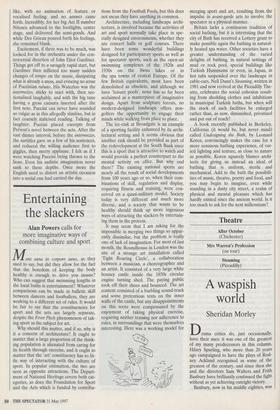Theatre
After October (Chichester) Mrs Warren's Profession (on tour) Steaming (Piccadilly)
A waspish world
Sheridan Morley
Drama critics do, just occasionally, have their uses: it was one of the greatest of my many predecessors in this column, Hilary Spurling, who more than 20 years ago campaigned to have the plays of Rod- ney Ackland recognised as some of the greatest of the century, and since then she and the directors Sam Walters and Frith Banbury have brilliantly continued the fight without as yet achieving outright victory. Banbury, now in his middle eighties, was sadly too ill to complete the current pro- duction of Ackland's After October at the Minerva, but Keith Baxter has in his absence come up with a rich and rare revival of the drama which, in Ackland's lifetime, was his only real West End hit exactly 60 years ago.
Then, it was Ackland himself who played the role of the young dramatist whose long- awaited first night turns out to be a fiasco, and for those who believe in him as the `English Chekhov' the experience must have been much akin to that of watching a young Anton playing Konstantin in The Seagull.
The Chekhovian parallels are easily drawn; everyone in After October wants something they are clearly not going to get in this life, whether it be theatrical success or romantic happiness or just a decent hot meal. The play aches with reality; Ackland himself had been a lodger in the house of the actress Mary Merrall who is clearly the inspiration for the role played here by Dorothy Tutin, just as Ackland himself is the young writer facing his first major flop. In a strong cast Nick Waring plays the son, with Murray Melvin as the equally failed poet who represents his conscience; a lot of 1930s backstage history is being worked out here in front of an audience, and, if Bax- ter's production sometimes goes a little manic in its determination never to bore, latterday theatregoers unlikely to be famil- iar with Ackland's waspish, bitchy world (he was a happily-married gay), that is a small price to pay for the return of a real curiosity.
In the end, the resonances here are not so much of Chekhov or Coward but rather of an American contemporary Thirties clas- sic like Saroyan's The Time of Your Life or Kaufman-Hart's You Can't Take It With You, plays full of weird and wondrous eccentrics but shot through with a deep kind of melancholic nostalgia, that sense of a world about to disintegrate at least partly because of its own lethargic inability to face the new realities. If Ackland had ever writ- ten for an American audience, he'd have been filmed by Preston Sturges or Frank Capra and you can't do much better than that; in the meantime he remains the best bridge from Coward to Rattigan, inclining towards the progressives but still rooted in drawing-room comedies of appalling man- ners. This week After October moves to Greenwich for a month; catch it there if you can, though it richly deserves a Shaftesbury Avenue address for the summer.
Also on the road at present is Mrs War- ren's Profession in a sturdy if not hugely exciting production by Alan Strachan for the Touring Partnership, a group of region- al theatres which have wisely formed them- selves into a network of shared costs. Penelope Keith stars as the unrepentant brothel-owner in the play that (though rather less powerful than Widowers' Houses or Major Barbara with which it shares the common theme of 'distasteful' money-mak- ing) all the same remains one of Shaw's briskest and most timely of dramas. Car- olyn Backhouse is suitably unforgiving as Vivie, first of the modern feminists, but this remains a dutiful rather than revelatory revival.
At the Piccadilly, Steaming is an equally brisk but rather more pointless revival of Nell Dunn's 1970s hit about six women staging a pool-side protest at the threat- ened closure of their public baths; like many surprise hits of that period, this one really doesn't stand up to a revisit, especial- ly as the closure of public baths no longer seems to be very high on the national agen- da at a time when hospitals and schools are the greater danger. All the same, six nude women can usually be relied on to sell a good many tickets in Soho, and there are some intelligent performances here from the gargantuan Julie T. Wallace, Sheila Reid as her minuscule mother and Diane Langton who eventually takes to the flying trapeze in a forlorn attempt to give the play the ending it has always lacked.



































































 Previous page
Previous page